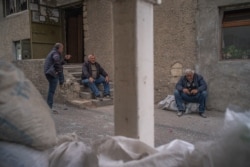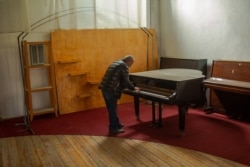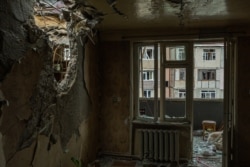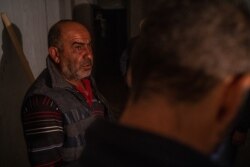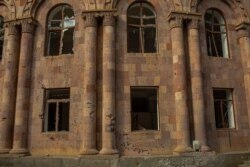"Hey, hey, let's go there," said one man to another, as sirens started to wail. The sirens were supposed to go off before the strikes, but on Friday that wasn't the case.
The men dashed across the street and into a basement surrounded by sandbags in Nagorno-Karabakh's regional capital, Stepanakert, as bombs continued to explode.
After more than two weeks of renewed fighting in this nearly 30-year-old conflict, more people can be found underground than on the streets. In the basement, a man who called himself Lord Milord said this fight is different from the battles in 2016, and even from the war in the 1990s that left tens of thousands of people dead and more than a million displaced.
"The difference is the advanced weaponry," he said, smoking a cigarette in the dark of the underground bunker. "Before it was never so tense."
About 40 kilometers away in Martuni, a town much closer to the front lines, Leonard Houhannisyan, 61, played a mournful tune on a broken piano.
Only days after some places reopened last month from a coronavirus lockdown, drones began buzzing above, sometimes dropping bombs. The cultural center and music school where he used to perform was once again shuttered.
Late last week, a strike hit nearby, shattering windows and splintering furniture in some of the classrooms.
"I am not a betrayer," Houhannisyan said, assessing the damage. "I was born here and I will not go anywhere."
Contested region
"Who goes where" is the central question of this war, with both Azerbaijan and ethnic Armenians claiming Nagorno-Karabakh, a breakaway enclave, as their own.
After battles of the 1990s, the region declared itself independent, even though it falls squarely within the internationally recognized borders of Azerbaijan. It does not claim to be part of Armenia, but the current inhabitants and leaders are primarily ethnic Armenian, and Armenia is fighting for the region in this war.
But the majority of people displaced in the 1990s were Azerbaijani, and now as many as a million people remain displaced from their homes, according to analysts.
"They were forcibly expelled," said Zaur Shiriyev, a South Caucasus analyst with the International Crisis Group. "Now they want to go back."
On Sunday, a strike hit Ganja, Azerbaijan's second-largest city, about 100 kilometers from the front lines, killing as many as nine civilians. Families said for them, the war has become a kind of "tyranny," uprooting their lives and harming their children.
"One of my brothers' two houses is demolished," said Vesile Mehmedova, who rushed to the scene of the attacks fearing for her brother and his family, according to the Reuters news agency. "[My brother's] son and his wife are wounded. His older son is on the front line. What can I say? God forbid anyone living a day like this."
Armenians in Nagorno-Karabakh and in Armenia itself say this war is an existential threat and they are defending their right to be a people with a homeland.
Azerbaijanis say the area has been illegally occupied for nearly 30 years, and their people have the right to go home.
Both sides blame each other for the violence and report civilian casualties among the hundreds of dead. Some estimates say half the population of Nagorno-Karabakh, about 75,000 people, has been displaced in recent weeks.
In the basement in Stepanakert, Lord Milord pondered the possibility of Azerbaijanis and Armenians living peacefully together, as they did when they were Soviet republics.
"I cannot imagine we can live together," he said. "But maybe we could live in peace."
Elusive cease-fire
Peace, however, seems far away.
On Saturday, a Russia-brokered cease-fire was announced early in the morning, set to begin at noon local time. The purpose was to let the warring parties exchange prisoners and the bodies of their dead.
By 1 p.m., both sides had accused the other of fresh violence, and a few hours later bombs could be heard again in Stepanakert.
"Sooner or later it will be calm," said Pargev Martirosyan, archbishop of Artsakh, the Armenian local name for Nagorno-Karabakh. "Sooner or later every war will finish, will stop. But when it will come ... ."
The archbishop trailed off, shrugging. A few minutes later a bomb went off, and he was ushered out the door and into the church basement.
For now, the war is mostly between Armenia and Azerbaijan, but Turkey is already openly supporting Azerbaijan and Russia has a security pact with Armenia. These two powers are currently facing off in Libya and Syria, and some analysts fear another proxy war that could destabilize the region and beyond.
International apathy could also make the war potentially more dangerous than ever before, according to Shiriyev, of the International Crisis Group. The United States has been notably quiet on the conflict, with Secretary of State Mike Pompeo saying little, but, "We deplore the loss of human life and remain committed to a peaceful settlement," in a tweet on Tuesday.
At the bombed-out music school, Houhannisyan, the pianist, questioned why the international community hadn't already taken action to stop the shelling of civilian towns.
"What is the world thinking?" he asked.






